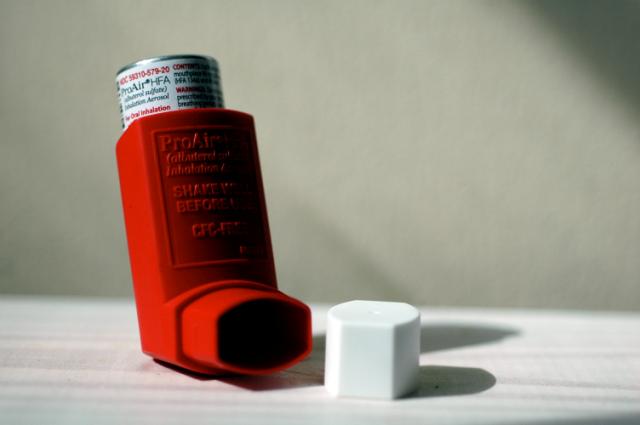Playlist
Show Playlist
Hide Playlist
Dyspnea: Diagnosis
-
Slides Dyspnea AcuteCare.pdf
-
Download Lecture Overview
00:01 Diagnostic workup, I'm sure you're familiar with this, starting with a chest x-ray. 00:06 This chest x-ray, you see those large lung volumes without a lot of landmarks, flattened diaphragms, consistent with chronic obstructive pulmonary disease. 00:15 And EKG is a good idea for any older patient with dyspnea as well. 00:19 They might have had a silent myocardial infarction. 00:21 We can detect it with an EKG. 00:24 Spirometry with a bronchodilator is absolutely going to be critical. 00:27 I highlight it because it's underused, but it's a relatively simple test to do. 00:32 Can be critical in differentiating asthma from COPD, which this patient may have some component of both, but you're not going to know without objective testing with a spirometry and with a bronchodilator response specifically. 00:45 Lab, checking the CBC, particularly for anemia, may worsen dyspnea. 00:52 Basic metabolic panel is always a good idea. 00:55 Brain natriuretic peptide or N-terminal brain natriuretic peptide are underused. 01:00 For this patient, I will describe why BNP can be particularly helpful. 01:05 And possibly a D-dimer. 01:07 If you're worried about the potential for chronic pulmonary embolism, maybe somebody who has a history of acute events and a few months later is still having dyspnea, the D-dimer can be helpful in possibly making pulmonary embolism less likely if it’s negative. 01:27 But among patients with a history of thrombosis, I wouldn't bother getting a D-dimer because it's not going to be helpful as patients – you will need a further evaluation potentially with CT scanning of the chest for PE. 01:39 Complete PFTs many times don't add a lot to just basic spirometry with a bronchodilator. 01:46 So, not necessary for the majority of patients, but certainly echocardiography. 01:51 If heart failure is suspected every patient deserves an echocardiogram. 01:55 Chest CT, evaluating things like pulmonary fibrosis, the chance for chronic PE, rare conditions, usually not necessary. 02:06 And a lot of patients do go through cardiac stress testing just because they are at increased risk of cardiovascular disease and myocardial infarction. 02:16 So, let’s return to our case and just what we think about it. 02:20 So, there it is again in front of you. 02:23 And there is this vital sign. 02:25 Now, here we added something on exam. 02:28 He has moderate distress. 02:31 His pulmonary exam reveals mild wheeze and coarse breast sounds at the bases. 02:35 He has trace pedal edema and otherwise his exam is normal. 02:39 So, where do you want to go from here is the question? I think those labs I mentioned are certainly going to be valuable here. 02:46 And let's return to that concept of using BNP, your brain natriuretic peptide. 02:51 He clearly has some kind of pulmonary disease. 02:55 He has that long smoking history. 02:57 I wouldn't be surprised if he has COPD. 03:00 Does he have some component of asthma? Well, that’s what – we’re going to send him for spirometry if he hasn't had that done already. 03:06 I'm also going to put him back on his agents because I don't know what's going on. 03:11 I do know that his oxygen saturation is little bit on the borderline and he’s slightly tachypnic. 03:18 So, therefore, I want to put them on the medicines that he has been on until I get his pulmonary function ironed out. 03:25 Once I differentiate whether he has asthma, COPD or both, that's going to help me decide what other treatment he might need at that time. 03:35 But I'm also really concerned. 03:37 He has edema. 03:39 That's concerning for the potential at least for heart failure. 03:44 It wouldn’t be shocking in a patient with a long smoking history. 03:48 And so, therefore, getting a BNP can be quite helpful for differentiating dyspnea in a patient like this because if the BNP is normal it's very unlikely that he has a heart failure and, therefore, you can really focus on his pulmonary conditions. 04:04 But if it's positive, echocardiogram, and think about changing some of those drugs he’s taking. 04:10 Remember, he’s taking multiple drugs for his blood pressure, yet his blood pressure isn’t well-controlled. 04:14 Maybe it will be something to consider switching those drugs around, so we can treat him more effectively for heart failure as well. 04:22 And also checking adherence because, with three drugs onboard, it's hard to believe his blood pressure is really that high. 04:30 So, hopefully, that gives you an idea of the approach to management with dyspnea. 04:34 It is a challenge and can be a conundrum in terms of figuring out what's the right diagnosis, but those are some simple steps you can take, and too often are not taken for these patients to get them on the right types of therapy. 04:48 Now you can. 04:49 Congratulations.
About the Lecture
The lecture Dyspnea: Diagnosis by Charles Vega, MD is from the course Acute Care.
Included Quiz Questions
Which of the following exams is most readily useful in differentiating COPD from asthma?
- Spirometry before and after bronchodilator therapy
- Brain natriuretic peptide
- Pulmonary auscultation
- History of smoking
- Chest X-ray
Abnormal levels of which of the following tests favors a diagnosis of heart failure over chronic obstructive pulmonary disease?
- Brain natriuretic peptide
- Oxygen saturation
- C-reactive protein
- Hemoglobin
- D-dimer
Which of the following conditions is most suggestive of heart failure?
- Peripheral edema
- Low levels of brain natriuretic peptide
- Spirometry moderately responsive to a trial of bronchodilators
- A flattened diaphragm on chest X-ray
- An irregular rhythm on electrocardiography
Customer reviews
5,0 of 5 stars
| 5 Stars |
|
5 |
| 4 Stars |
|
0 |
| 3 Stars |
|
0 |
| 2 Stars |
|
0 |
| 1 Star |
|
0 |




